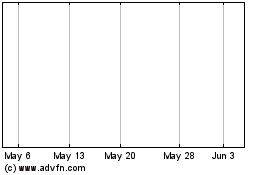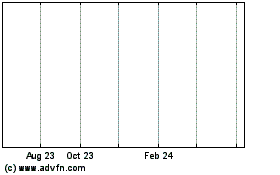Chiron Announces Promising Data from Clinical Study of Adjuvanted Avian Influenza Vaccine; Results Confirm Previous Clinical Stu
October 28 2005 - 9:00AM
Business Wire
Chiron Corporation (NASDAQ:CHIR) today announced preliminary
promising data from a clinical study of its investigational vaccine
against an H9N2 avian influenza strain that has infected a small
number of people and may have the potential to cause a human
pandemic. The trial was supported by the National Institute of
Allergy and Infectious Diseases (NIAID), part of the U.S. National
Institutes of Health (NIH). The 96-patient study explored the
safety and immunogenicity of four different doses of the
investigational vaccine with and without Chiron's adjuvant MF59. An
adjuvant is a substance that is added to a vaccine to boost the
body's immune response to the vaccine's antigen. All vaccine
formulations containing the adjuvant MF59 proved highly
immunogenic, inducing antibody levels believed to confer protection
against the influenza strain. The lowest dose contained 3.75
micrograms of antigen per dose, a quarter of the dose used in
seasonal influenza vaccines. In marked contrast, the unadjuvanted
vaccine induced significantly lower antibody titers and did not
reach levels achieved by the adjuvanted vaccine following any of
the antigen doses tested, which ranged from 3.75 to 30 micrograms.
"This study builds on the clinical data Chiron has already
established with adjuvanted influenza vaccines," said Rino
Rappuoli, Ph.D., chief scientific officer of Chiron and head of
research for Chiron Vaccines. "With more than 20 million doses of
MF59-adjuvanted vaccine distributed outside of the United States
for seasonal vaccination, we have built an impressive safety
database. In addition, our previous clinical studies of a vaccine
designed to protect against H5 avian influenza have demonstrated
the potential of our adjuvant to reduce the required dose of
antigen and to cross-protect against a range of related viral
strains. "This important collaborative research further advances
our understanding of the role innovative adjuvant technology can
play in enhancing the immune response to pandemic vaccines,
providing the potential for dose-sparing to stretch production
capacity," continued Dr. Rappuoli. "Following these successful
results, we look forward to clinical studies of an adjuvanted H5N1
vaccine planned for the near future." "Adjuvants could be an
important means of improving the immune response to potential
pandemic strains and allow us to stretch production capacity,"
added Walter A. Orenstein, M.D., professor of medicine of
pediatrics and associate director of the Emory Vaccine Center in
Atlanta, Georgia. "Public-private partnerships are an essential
part of our preparations for a potential pandemic, and this study
clearly demonstrates their value," said Dan Soland, president of
Chiron Vaccines. "NIAID has taken the lead in sponsoring clinical
trials to determine the optimal characteristics of an effective and
safe pandemic vaccine. This trial builds on that knowledge,
providing valuable data on the importance of using adjuvants, which
may be critical for extending the vaccine supply to reach as many
people as possible." About Pandemic Influenza Pandemic influenza
occurs when a new influenza virus emerges that is easily
transmitted among humans and causes serious illness. In this
situation, the virus can result in a worldwide outbreak of disease,
or pandemic. Pandemic influenza occurred three times in the last
century. The 1918 pandemic killed at least 40 million people
worldwide, with a mortality rate of approximately 2.5 percent in
the United States. Avian influenza, or "bird flu," does not
normally infect humans, but there have been several examples in
recent years of transmission to people, leading to fears of a
strain with the potential to result in a pandemic. The current
outbreak of H5N1 avian influenza in Southeast Asia has resulted in
more than 100 human cases, in Cambodia, Indonesia, Thailand and
Vietnam, with a mortality rate of approximately 50 percent. Despite
the death or destruction of an estimated 150 million birds, the
virus is now considered endemic in a number of regions in Southeast
Asia. Media Materials For images and video related to Chiron
Vaccines, please visit www.thenewsmarket.com/chiron. Journalists
may register and download print-quality images and
broadcast-standard video from this site at no charge. About Chiron
Chiron delivers innovative and valuable products to protect human
health by advancing pioneering science across the landscape of
biotechnology. The company works to deliver on the limitless
promise of science and make a positive difference in people's
lives. For more information about Chiron, please visit
www.chiron.com. This news release contains forward-looking
statements, including statements regarding development of pandemic
influenza vaccines and adjuvants, regulatory approvals,
improvements to manufacturing facilities, product development
initiatives, and product marketing, which involve risks and
uncertainties and are subject to change. A discussion of the
company's operations and financial condition, including factors
that may affect its business and future prospects that could cause
actual results and developments to differ materially from those
expressed or implied by these forward-looking statements, is
contained in documents the company has filed with the SEC,
including the Form 10-K for the year ended December 31, 2004, and
the Form 10-Q for the quarter ended June 30, 2005, and will be
contained in all subsequent periodic filings made with the SEC.
These documents identify important factors that could cause the
company's actual performance to differ from current expectations,
including, among others, litigation and investigations relating to
influenza vaccines, the outcome of clinical trials, regulatory
review and approvals, manufacturing capabilities, intellectual
property protections and defenses, litigation, stock-price and
interest-rate volatility, marketing effectiveness, and the severity
of the 2005-2006 influenza season. In particular, there can be no
assurance that additional issues with respect to influenza vaccines
or Chiron's manufacturing generally will not arise in the future,
or that Chiron will be able to increase sales of existing products,
successfully develop and receive approval to market new products
(including pandemic influenza vaccines), or achieve market
acceptance for such new products. The company may face additional
competition in the influenza market in the future and challenges in
distribution arrangements as a result of vaccine developments. In
addition, the company may engage in business opportunities, the
successful completion of which is subject to certain risks,
including approval by Novartis AG, regulatory approvals and the
integration of operations. Chiron does not undertake an obligation
to update the forward-looking information the company is giving
today.
Chiron (NASDAQ:CHIR)
Historical Stock Chart
From May 2024 to Jun 2024

Chiron (NASDAQ:CHIR)
Historical Stock Chart
From Jun 2023 to Jun 2024
